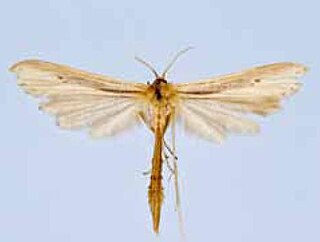
Triadenum, known as marsh St. John's worts, is a small genus of flowering plants in the family Hypericaceae. The genus is characterized by opposite, blunt-tipped leaves and pink flowers with 9 stamens. They are distributed in North America and eastern Asia.

Baccharis is a genus of perennials and shrubs in the aster family (Asteraceae). They are commonly known as baccharises but sometimes referred to as "brooms", because many members have small thin leaves resembling the true brooms. They are not at all related to these however, but belong to an entirely different lineage of eudicots. B. halimifolia is commonly known as "groundsel bush", however true groundsels are found in the genus Senecio.

Baccharis pilularis, called coyote brush, chaparral broom, and bush baccharis, is a shrub in the family Asteraceae native to California, Oregon, Washington, and Baja California. There are reports of isolated populations in New Mexico, most likely introduced.

Pluchea is a genus of flowering plants in the tribe Inuleae within the family Asteraceae. Members of this genus might be known as camphorweeds, plucheas, or less uniquely fleabanes. Some, such as P. carolinensis and P. odorata, are called sourbushes. There are plants of many forms, from annual and perennial herbs to shrubs and trees, and there is variation in the morphology of leaves, flowers, and fruits.

Pluchea sericea, commonly called arrowweed or cachanilla (Mexico), is a rhizomatous evergreen shrub of riparian areas in the lower Sonoran Desert and surrounding areas. It is common in the lower Colorado River valley of California, Nevada and Arizona, as far east as Texas, and in northern Mexico where it often forms dense impenetrable thickets. It is a perennial shrub and grows along watercourses.

Baccharis salicifolia is a blooming shrub native to the sage scrub community and desert southwest of the United States and northern Mexico, as well as parts of South America. Its usual common name is mule fat; it is also called seepwillow or water-wally. This is a large bush with sticky foliage which bears plentiful small, fuzzy, pink, or red-tinged white flowers which are highly attractive to butterflies. It is a host plant for the larval stage of the fatal metalmark butterfly, and the adult stage also nectars on the flowers.

Baccharis halimifolia is a North American species of shrubs in the family Asteraceae. It is native to Nova Scotia, the eastern and southern United States, eastern Mexico, the Bahamas, and Cuba.

Baccharis sarothroides is a North American species of flowering shrub known by the common names broom baccharis, desertbroom, greasewood, rosin-bush and groundsel in English and "escoba amarga" or "romerillo" in Spanish. This is a spreading, woody shrub usually sticky with glandular secretions along the primarily leafless green stems. The small, thick leaves are a few centimeters long and are absent much of the year, giving the shrub a spindly, twiggy appearance. It flowers abundantly with tiny green blooms on separate male and female plants.

Butomus is the only known genus in the plant family Butomaceae, native to Europe and Asia. It is considered invasive in some parts of the United States.

Senecio crassiflorus, in Portuguese: margarida-das-dunas, one of the native South American Senecio and an herbaceous dune dwelling perennial.

Atriplex lentiformis is a species of saltbush.

Pluchea odorata is a species of flowering plant in the aster family, Asteraceae. Common names include sweetscent, saltmarsh fleabane and shrubby camphorweed.

Hellinsia balanotes, the baccharis borer, is a moth of the family Pterophoridae which is native to Guatemala, northern Mexico, and the United States including Arizona, Texas, Florida, Mississippi, South Carolina and Maryland, but has been introduced to Australia for the control of Baccharis halimifolia. The species was first described by Edward Meyrick in 1908.

Baccharis salicina is a species of plant in the family Asteraceae. Common names include willow baccharis, and Great Plains false willow. It is a shrub found in North America where it grows in mildly saline areas.

Baccharis angustifolia is a species of North American plants in the family Asteraceae. It is native to the Southeastern United States from Louisiana to North Carolina.
Baccharis texana is a North American species of shrubs in the family Asteraceae known by the common name prairie baccharis or false willow. It is native to northeastern Mexico and to the southern part of the Great Plains of the United States.
Baccharis thesioides is a North American species of shrubs in the family Asteraceae known by the common name Arizona baccharis. It is widespread in Mexico from Chihuahua to Oaxaca, and also found in the southwestern United States.

Pluchea camphorata, known as camphorweed or marsh-fleabane, is a small flowering herbaceous annual plant of the family Asteraceae.

Pluchea carolinensis is a plant in the genus Pluchea.

Baccharis genistelloides is a species of flowering plant from the family Asteraceae. It is one of the most studied species in its genus Baccharis regarding its phytochemistry and pharmacological effects. The plant species is widely used in folk medicine.


















